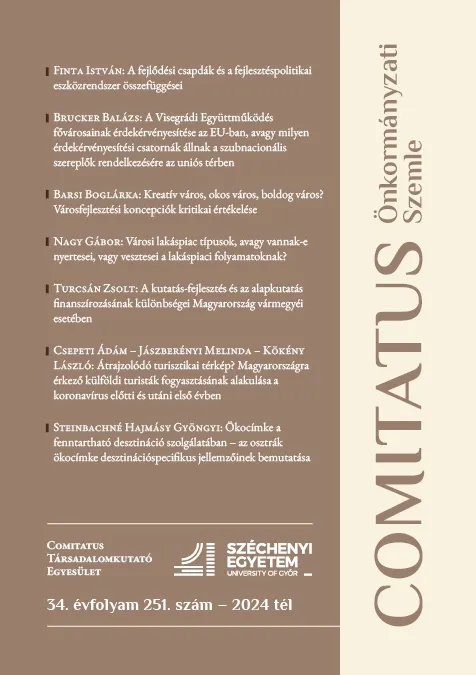Egyetemi hallgatók felelős fogyasztása
– Pilot kutatás a Pannon Egyetem Turizmus szakos hallgatói körében a Veszprém- Balaton 2023 Európa Kulturális Fővárosa Program tapasztalatai
Responsible Consumption of University Students – Pilot Research among Tourism Students at the University of Pannonia
| LETÖLTÉS | DOI: 10.59809/Comitatus.2023.33-247.55 |
|
Szerzők: Gyurácz-Németh Petra, egyetemi docens, Pannon Egyetem, Gazdaságtudományi Kar, Turizmus Intézeti Tanszék, nemeth.petra@gtk.uni-pannon.hu, ORCID: 0000-0003-1047-6347 Steinbachné Hajmásy Gyöngyi, adjunktus, Pannon Egyetem, Gazdaságtudományi Kar, Turizmus Intézeti Tanszék, hajmasy.gyongyi@gtk.uni-pannon.hu, ORCID: 0009-0005-8728-7757 Kulcsszavak: fenntarthatóság | felelős fogyasztás | turizmus hallgatók JEL kód: Q01 |
Authors: Petra Gyurácz-Németh, Associate Professor, University of Pannonia, Faculty of Business and Economics, Department of Tourism, nemeth.petra@gtk.uni-pannon.hu, ORCID: 0000-0003-1047-6347 Gyöngyi Steinbachné Hajmásy, Senior Lecturer, University of Pannonia, Faculty of Business and Economics, Department of Tourism, hajmasy.gyongyi@gtk.uni-pannon.hu, ORCID: 0009-0005-8728-7757 Keywords: sustainability | responsible consumption | tourism students JEL code: Q01 |
Absztrakt: A tanulmány témája napjaink egyik rendkívül aktuális kérdése a felelős fogyasztás, mely a fenntartható fejlődés egyik fontos célja és eszköze is. A tanulmány egy kérdőíves, primer kutatás segítségével vizsgálja, hogy a turizmust tanuló hallgatók mennyire tartják fontosnak a felelős fogyasztás egyes tényezőit. A kutatás eredményei alapján megállapítható az egyének felelős fogyasztási szintje, valamint az, hogy az egyes tényezők közül melyik mekkora fontossággal bír a hallgatók körében. Továbbá, hogy a mintában szereplő magyar nyelven tanuló hallgatók körében az újrahasznosított csomagolású termékek fogyasztása a leginkább jellemző tényező, míg az angol nyelven tanuló hallgatók esetében a helyi termékek fogyasztása lett a leglényegesebb. A felelős fogyasztási szinteknél nem állapítható meg szignifikáns különbség a magyarul és angolul tanuló hallgatók között, illetve a vizsgált demográfiai tényezők sem adnak magyarázatot a felelős fogyasztásban tapasztalható különbségekre.
Abstract: The topic of the study is one of the most topical issues of our time, responsible consumption, which is both an important goal and a tool for sustainable development. The study uses questionnaire-based primary research to investigate the importance of each factor of res-
ponsible consumption among tourism students. The results of the research help to determine the level of responsible consumption of individuals and the importance of each of the factors among students. Based on the data collected, it can be concluded that among the sample of students studying in Hungarian, the consumption of products with recycled packaging was the most important factor, while for students studying in English, the consumption of local products was the most important. No significant difference was found between Hungarian and English students in the responsible consumption levels.
IRODALOMJEGYZÉK
Calderon-Monge, Esther – Pastor-Sanz, Ivan – Javier, Sendra Garcia F.: Analysis of sustainable consumer behavior as a business opportunity, Journal of Business Research, 2020/120, 74–81. https://doi.org/10.1016/j.jbusres.2020.07.039
Csigéné Nagypál Noémi – Görög Georgina: A társadalmilag felelős fogyasztás egyes jellemzőinek vizsgálata egyetemi hallgatók körében, Vezetéstudomány, 2015/2, 3–18.
Dudás, Katalin: A tudatos fogyasztói magatartás dimenziói, Vezetéstudomány, 2011/42, 47–55. https://doi.org/10.14267/VEZTUD.2011.07.06
Dudás Katalin: A tudatos fogyasztói magatartás dimenziói, különös tekintettel a mások érdekeire fókuszáló felelős fogyasztásra, Vezetéstudomány, 2012/46, 52–63.
Formádi Katalin – Gyurácz-Németh Petra: Turisztikai karrierperspektívák vizsgálata a Covid19-járvány árnyékában – Turizmus-menedzsment mesterszakos hallgatók percepciói, Turizmus Bulletin, 2021/21, 14–24. https://doi.org/10.14267/TURBULL.2021v21n4.2
Formádi, Katalin – Papp, Zsófia Márta: Hazai karrierkutatások szisztematikus szakirodalom elemzése, különös tekintettel az egyetemi hallgatókat vizsgáló tudományos szakcikkekre, Marketing és Menedzsment, 2023/56, 35–46. https://doi.org/10.15170/MM.2022.56.04.04.
Joshi, Yatish – Rahman, Zillur: Consumers’ Sustainable Purchase Behaviour: Modeling the Impact of Psychological Factors, Ecological Economics, 2019/159, 235–243. https://doi.org/10.1016/j.ecolecon.2019.01.025
Joshi, Yatish – Rahman, Zillur: Investigating the determinants of consumers’ sustainable purchase behaviour, Sustainable Production and Consumption, 2017/10, 110–120. http://dx.doi.org/10.1016/j.spc.2017.02.002
Kotler, Philip: Marketingmenedzsment, Műszaki Könyvkiadó, Budapest, 2008.
Perera, Liyanage Chamila Roshani – Hewege, Chandana Rathnasiri: Climate change risk perceptions and environmentally conscious behaviour among young environmentalists in Australia, Young Consumers Insight and Ideas for Responsible Marketers, Published by Emerald, 2013/14, 139–154. https://doi.org/10.1108/17473611311325546
Medeiros, Janine Fleith de – Ribeiro, Jose Luis Duarte: Environmentally sustainable innovation: Expected attributes in the purchase of green products, Journal of Cleaner Production, 2017/142, 240–248. https://dx.doi.org/10.1016/j.jclepro.2016.07.191
Samavatyan, Hossein – Akhoondi, Fereshteh – Zareie, Shadi: Consumer Social Responsibility: toward a comprehensive index, OIDA International Journal of Sustainable Development, 2014/07, 81–92.
Shao, Jing – Taisch, Marco – Ortega-Mier, Miguel: Influencing factors to facilitate sustainable consumption: from the experts’ viewpoints, Journal of Cleaner Production, 2017/142, 203–216. http://dx.doi.org/10.1016/j.jclepro.2015.12.111
Shiel, Chris – Paço, Arminda do – Alves, Helena: Generativity, sustainable development and green consumer behaviour, Journal of Cleaner Production, 2020, 245, 118865. https://doi.org/10.1016/j.jclepro.2019.118865
Singjai, Komkrit – Winata, Lanita – Kummer, Tyge-F.: Green initiatives and their competitive advantage for the hotel industry in developing countries, International Journal of Hospitality Management, 2018/75, 131–143. https://doi.org/10.1016/j.ijhm.2018.03.007
Toussaint, Mariana – Cabanelas, Pablo – González-Alvarado, Tania E.: What about the consumer choice? The influence of social sustainability on consumer’s purchasing behavior in the Food Value
Chain, European Research on Management and Business Economics, 2021/27, 100–134. https://doi.org/10.1016/j.iedeen.2020.100134
Törőcsik Mária – Szűcs Krisztián: Fogyasztói magatartás Mintázatok, trendek, alkalmazkodás, Akadémiai Kiadó, Budapest, 2021.
Webb, Deborah J. – Mohr, Lois A. – Harris, Katherine E.: A re-examination of socially responsible consumption and its measurement, Journal of Business Research, 2008/61, 91–98. https://doi.org/10.1016/j.jbusres.2007.05.007
Internetes források
Egyesült Nemzetek Szervezete, Sustainable Development Goals: https://sdgs.un.org/goals (Letöltés ideje: 2023.09.08.)


